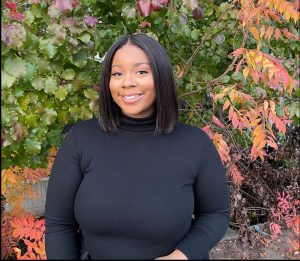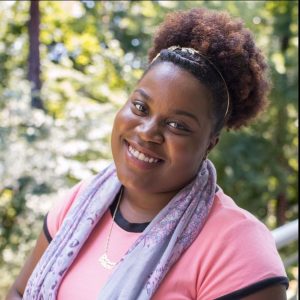Each year, The Graduate School honors graduate students in programs throughout the University for their powerful discoveries that contribute to a better future for people and communities in North Carolina. Eleven Impact Awards and five Horizon Awards for 2021 were announced during Graduate and Professional Student Week.
The longstanding Impact Award, made possible through the generous support of the Graduate Education Advancement Board, recognizes discoveries with a direct impact on our state in the present time.
The Horizon Award, first presented in 2017, recognizes discoveries with future potential to benefit North Carolina (and beyond).
There were a number of College winners; see the complete list.
Below we spotlight two of the winners: Alexandra Odum and Diamond Holloman.

Through Documentary’s Focus, Seeking Solutions to Racial Achievement Gap
Alexandra Odom, doctoral student in history
Impact Award
“When the “I’m Smart Too” documentary project began, Chapel Hill-Carrboro City Schools (CHCCS) had garnered national attention for its racial achievement gap. Within the CHCCS, white students are more likely to get proficient scores on end-of-year exams and less likely to face disciplinary actions. By the time students graduate, the data show significant disparities in outcomes and opportunities. Our documentary team, comprised of two former CHCCS educators and UNC students, set out to shed light on the harm that lies at the root of these disparities. That is, to highlight the human aspect of the story that often gets trivialized and forgotten in statistical representation.
I joined the team as a historical consultant with the goal of fully contextualizing the unique history of the CHCCS district, including desegregation and the ways it is inextricably linked to present circumstances. As a result of our extensive interviews with community members and stakeholders, archival research and historical work, our film was able to highlight the nature and extent of the problem. Since the film has been completed, we have continued to uplift the voices of the local community and partnered with local organizations to host film viewings and panels. These viewings have begun to provide a space for community members to come together to find ways to move forward and impact meaningful and long-lasting change within local schools.
The district’s racial achievement gap and systems of gifted programming, through which advantage is often structured, mirror the circumstances of multiple school districts within North Carolina. It is our hope that the community efforts within this school district as a result of the “I’m Smart Too” documentary can inspire statewide improvements and contribute to the betterment of public schooling in North Carolina and beyond.”
***

‘I Didn’t Want to Be a Victim’: Examining Grassroots, Long-Term Hurricane Recovery
Diamond Ebanks Holloman, doctoral student in ecology
Impact Award
“Disaster management strategies typically focus on the ways in which governmental and non-governmental agencies work to recover and repair physical damages following disaster events. In North Carolina especially, disaster recovery – namely, after hurricanes – is connected to both ecological and sociohistorical factors that relate to racial and ethnic marginalization, power and grassroots action.
Focusing on the aftermath of Hurricanes Matthew (2016) and Florence (2018) in Robeson County, N.C., my research examines the relationship between vulnerability, resilience and adaptation in African-American and Native American (Lumbee) neighborhoods. Using interviews and photography, I document the social aspects of living within African-American and Lumbee communities in Robeson County in the wake of disaster. These neighborhoods are situated in more flood-prone areas, as well as subjected to less financial aid and fewer resources in response to hurricanes; this dual form of ecological and social erosion of local response capacity makes it harder for them to successfully recover.
My research demonstrates that African-American and Lumbee communities note the gap between government assistance and their needs and strategize beyond narratives of vulnerability to provide for themselves and their communities in order to recover from hurricanes. I then examine grassroots action and mobilization as a mode of adapting to changing climates that is under-examined. Grassroots organization following disaster is a key component of these communities’ recovery and resilience strategies. Modeling an approach that emphasizes this creates more comprehensive, sustainable plans for communities of color in North Carolina, and potentially across the United States.”
